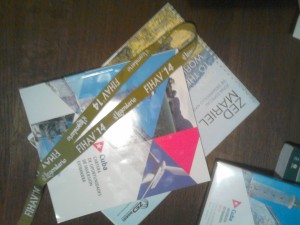Wholesale and Retail Buiness. Cuba-US common challenges ?
 The ongoing Cuban economic reforms in the “private” sector (Self-employed, Small business and the Cooperatives) “bonded” with the easing of US sanctions against Cuba has generated an overwhelming enthusiasm within the Island and especially in the Cuban exile community. Entrepreneurs are looking at wholesale and retail market as a big investment opportunity.
The ongoing Cuban economic reforms in the “private” sector (Self-employed, Small business and the Cooperatives) “bonded” with the easing of US sanctions against Cuba has generated an overwhelming enthusiasm within the Island and especially in the Cuban exile community. Entrepreneurs are looking at wholesale and retail market as a big investment opportunity.
We must not fail to admit the new approach of both governments regarding to a process which has been around for over 50 years, is not just a historic moment for both countries but also it’s a good new time for the Cuban people are coming soon. However, the path is not completely paved yet, there are some legal barriers, which we must consider.
The regulation of non-agricultural cooperatives establishes equal footing with the rest of the productive forms and services in the country, in terms of production, commercialization and services, according to the purposes for which it was founded. The cooperative as holder or owner of its products and services can make direct sales without intermediaries.
Trading activities in Cuba: How it works?
Wholesale and Retail business are run by agencies set up as corporations by the government, by foreign corporations (in partnership with the Government), or by an individual agent, who can obtain his license to operate by investing and partnering with local businesses. To obtain the license, importers and exporters will have to appoint an agent who will be able to obtain a license that will allow them to receive or send goods; however Agents and intermediaries can handle goods on consignment for licensed importers, but they can’t import directly and they can’t be a distributer either.
The non-state forms of management, which were approved for carrying out of foreign trade activities, should apply for grant of such powers and the authorized of export and import list of the products, according to the regulations issued for this purpose by the Ministry of Foreign Trade.
Import & Export from the United States to Cuba
The recently changes on the Export Administration Regulations (EAR) related to exports and reexports to promote more effectively positive change in Cuba’s private sector by supporting private economic activity. Items include building materials for use by the private sector to construct or renovate privately-owned buildings including privately-owned residences, businesses, places of worship and buildings for private sector social or recreational use; goods for use by private sector entrepreneurs such as auto mechanics, barbers and hairstylists and restaurateurs; and tools and equipment for private sector agricultural activity. It is intended to facilitate Cuban citizens’ lower-priced access to certain goods to improve their living standards and gain greater economic independence from the state. It also enables the export and reexport to Cuba of items to further support civil society in Cuba. (OFAC)
I wonder if, when the Obama’s administration issued the resolution described above, were they unaware of the Cuban export and import rules, has the decision been made deliberately?
How To start-up your business in Cuba
1st consideration – go to Cuba
If you haven’t done so already, visit Cuba. Get yourself familiar with the unique culture.
Your first business trip to the Island will be to introduce yourself and your business proposal, thus to get an overview of your new target market. Try to make as many appointments as you can with government representatives, civil servants, institutions and companies who can provide you with insight and guidance.
To explore or engage in business transactions in Cuba, travellers would need a business visa. To be involved in business operations in Cuba having entered the country with a Tourist visa card is in violation of Cuban Immigration regulations.
There are two types of business visas:
- Business visas to explore business possibilities in Cuba (A-7)
- Business visas to engage in business operations or transactions in Cuba (D-7)
The visa to explore business opportunities in Cuba does not require a letter of invitation from a Cuban Company, but it requires provision of information to the Cuban Consulate on the purpose of the trip. With this visa travellers can contact Cuban business institutions or companies to hold preliminary meetings or state declarations of intention.
The visa to engage in business operations or transactions requires a letter of invitation from a Cuban Company or institution.
Both types of business visas (A-7 and D-7) are issued for a maximum stay of 30 days in Cuba. Extensions of business visas must be requested to the Immigration Directorate in Cuba by the Cuban interlocutor or counterpart company. (Cuban consulates)
2nd consideration – gather facts
Market research: As there are no benchmarks, you will need to research your market carefully and diligently. For that you will need support of Cuba based consultancies. Cuban consultancies are state owned and services are either fixed price, or negotiated and charged per deliverable (not per hour). As everywhere else in the world, there are good and not so good consultancies in the country. Always ask for references of similar work, or ask someone you trust to recommend the right consultancy.
3rd consideration – re-evaluate your business ideas
Be clear on your vision: Come prepared with a clear and structured presentation, outlining in plain language (Spanish) the core of your business. You will need to get government officials on your side and behind your idea, otherwise you will not go very far. To get in contact to the right government officials you will need some local support.
In preparation put yourself in a Dragons’ Den / Shark Tank situation, where you confidently need to pitch your business ideas whilst showing good command of your numbers.
Coming back from your business trip you will certainly be loaded with new impressions and eventually new ideas. Stay flexible in your vision and adapt to new input. Cuba is different and will require you to think differently.
4th consideration – find a local partner
Get a companion/partner/associate: If possible don’t start your journey alone, get an ally who knows the culture, local regulations and who also understands your vision and goals. The road can be tiring and when hard times come and you’re about to give up, your will need a partner who helps finding solutions and keeps you upbeat.
Communication from the outside is still an issue in Cuba. Don’t expect access to phone and Internet services as widespread as in your own country. A local partner can help you to follow-up and drive negotiations from the inside.
5th consideration – get your legal documentation in order
Documents required for the presentation of businesses
- Authorized copy of the duly authenticated and registered deeds of incorporation, the business register certificate or a similar document of his country of origin that proves his standing, issued not earlier than six months ago.
- Financial statements of the last accounting period, certified by an independent entity.
- Bank guarantees issued not earlier than six months ago.
- Sponsorship letter of the head office, in case the investor is a branch or subsidiary or is represented by an off shore trading company.
- Certified consent of the management body which expresses their approval of the intended investment.
- Duly authenticated powers of attorney.
- Evidence of his experience in the activity targeted for the investment.
- In case of being a natural person, the investor must submit a copy of his identification documents and bank guarantees issued not earlier than six months ago.
In order to take legal effects in Cuba, all the financial and legal documentation must be authenticated by the various entities of the country concerned, its Ministry of Foreign Affairs and the consular office of the Cuban Embassy in the business person’s country of origin and must be translated into Spanish, in case they have been written in another language. Later the documents must be authenticated in Cuba by the Ministry of Foreign Affairs (MINREX by its Spanish acronyms) and registered before a Notary Public in the notarial offices attached to the Legal Services and Civil Societies.
The Landmark Speech
 On December, 17, 2014, Obama gave a speech on his intentions to normalized the diplomatic relations between Cuba and the USA, by supporting the Cuban people, and making changes to facilitate authorized travel for Americans to Cuba; as well as certain commerce and financial activities and the flow of communications to and from the island as well.
On December, 17, 2014, Obama gave a speech on his intentions to normalized the diplomatic relations between Cuba and the USA, by supporting the Cuban people, and making changes to facilitate authorized travel for Americans to Cuba; as well as certain commerce and financial activities and the flow of communications to and from the island as well.
The Department of Treasury’s Office of Foreign Assets Control (OFAC) amended the Cuban Assets Control Regulations toward Cuba. And yes indeed it’s a step forward for the Americans and the Cuban people, but the restrictions (Embargo) remain. So, what has really been changed?
OFAC has issued *general licenses within the 12 categories of authorized travel for many travel-related to or from Cuba that previously required a **specific license (i.e., an application and a case-by-case determination). Which means anyone who meets the requirements doesn’t need to apply for a license to travel to Cuba.
Categories:
Family visits; official business of the U.S. government, foreign governments, and certain intergovernmental organizations; journalistic activity; professional research and professional meetings; educational activities; religious activities; public performances, clinics, workshops, athletic and other competitions, and exhibitions; support for the Cuban people; humanitarian projects; activities of private foundations or research or educational institutes; exportation, importation, or transmission of information or information materials; and certain authorized export transactions.
Importation of goods
You can import goods from Cuba into the US which it’s total value doesn’t exceed $400. Take a note, you can’t import more than $100 of alcohol or tobacco. (This policy applies also to foreign persons entering the United States from travel that included Cuba). Be aware that you can’t buy alcohol or cigars of Cuban origin to import into US through a third country or via Internet.
Travel-related transactions
The new rule allows US travellers to use their credit or debit cards issued by an American financial institution.
Diem rate no longer applies, and there is not limit dollars on expenses.
Remittances have been raised from $500 per quarter to $2,000 per quarter.
Visitors may carry up to $10,000 in cash to Cuba for family remittances per authorized trip.
Certain remittances to Cuban nationals for humanitarian projects, support for the Cuban people, or development of private business are now generally authorized.
Telecommunications:
Commercial telecommunications services in Cuba or linking third countries and Cuba will be authorized, including telecommunications-related, transactions, payment related to the provision of telecommunications involving Cuba, or provided to Cuban individuals. Pursuant to this provision, U.S. citizens may, for example, purchase calling cards for people to use in Cuba and/or may pay the bills of such people directly to a telecommunications operator located in Cuba, such as ETECSA
Travel and carriers services
Travellers will be able to purchase their ticket directly from the airline offering the service. Airlines and travelers are responsible for maintaining records of their Cuba-related transactions for at least five years.
Support for the Cuban People
Humanitarian projects include medical and health-related projects; construction projects intended to benefit legitimately independent civil society groups; environmental projects; projects involving formal or non-formal educational training, within Cuba or off-island, on the following topics: Entrepreneurship and business, civil education, journalism, advocacy and organizing, adult literacy, or vocational skills; community-based grass-roots projects; projects suitable to the development of small-scale private enterprise; projects that are related to agricultural and rural development that promote independent activity; micro-financing projects, except for loans, extensions of credit, or other financing prohibited and projects to meet basic human needs.
The regulatory interpretation of “cash in advance”has been changed from “cash before shipment” to “cash before transfer of title and control” to allow expanded financing options for authorized exports to Cuba
A license is an authorization from OFAC to engage in a transaction that otherwise would be prohibited. There are two types of licenses: general licenses and specific licenses. *A general license authorizes a particular type of transaction for a class of persons without the need to apply for a license.**A specific license is a written document issued by OFAC to a particular person or entity, authorizing a particular transaction in response to a written license application.
Persons engaging in transactions pursuant to general or specific licenses must make sure that all conditions of the licenses are strictly observed
Original Source: http://content.govdelivery.com/accounts/USTREAS/bulletins/e9d4bd/
Cuba – The trade winds
A friend once told me: … All the goods I have in stock are needed in Cuba…to which I replied: From your point of view; I agree, in fact it’s not a bad assessment of the whole panorama. I’m afraid to disappoint you; but Cuba is not a consumer society yet. Therefore we have to take into account the difference between lacking and needing, which differ from one another.
There are specific regulations for foreign investment, regardless of contribution to the economy of the country; the investment also has to produce a social welfare to which Cuba is no exception. Even though the foreign investment law states that one may invest in all sectors -with the exception of education, health and military forces-; is important to acknowledge where the real possibilities of investment are.
Insight into where to invest:
Food and Agriculture
Rice is part of the daily diet of Cubans, but its production is limited due to the shortage of water and the lack of fertilizers and modern agricultural technology
The Cuban’s domestic market lacks commodities, as an example, the country currently imports 80% of food supplies to its population. Business oportunities …
Tourism
Last November, Havana held two of its major events -FIHAV/Business fair and The International Ballet Festival of Havana, which attracted many visitors. I tried to book a hotel on the second week of October, and all the hotels in Havana were already booked.
According to the Ministry of Tourism, Cuba received a record-breaking 3 million foreign tourists in 2014, which represents a 5.3% growth from the previous year. Business oportunities … …
Infrastructure (such as transportation, railways, highways, roads and communication)
Who does not know of the transportation issues in Cuba? When many of us call it the “travelling museum or museum on wheels”
Anyone who has been throughout the island knows also of the conditions of the highways. Business oportunities …
Renewable energy
Currently over 90% of the energy in Cuba is generated from oil, for which Cuba seeks to reduce its consumption levels to 24% through an investment plan for renewable energy Business oportunities …
Bio-pharma industry
Cuba is well known for its health system and its commitment in this field. According to officials sources 12% of the Cubans export comes from the bio-pharma industry. The Cuban biotechnological and pharmaceutical industry offers a major opportunity to foreign investment given its scientific research, production and commercialization of its products. Business oportunities …
Some investors may testify about trading & Investment in Cuba
Sherritt international: Since 1994 it operates Cuba’s large nickel mining, which is the second largest nickel reserves in the world after Russia)
Damen Group: Shipbuilding & Engineering; established in Cuba since January 1995
Meliá Hotels International, S.A: Established in Cuba since 1990 is one of the largest hotel companies in the world and the largest hotel chain in Spain in both resort and city hotels. The company currently operates more than 350 hotels in 35 countries and 4 continents under its brands: Meliá, Gran Meliá, ME by Meliá, Paradisus, Innside by Meliá, TRYP by Wyndham, Sol Hotels and Club Meliá. (http://www.meliahotelsinternational.com/en)
Nirint Shipping: Established in Cuba since 1992.
Indiana Finance BV (formerly Fondel Finance BV): One of the world’s leading metal trading companies; with more than four decades trading -nickel- with Cuba. This company conducts 70 percent of trade between the Netherlands and Cuba.
FIHAV: Discover first-hand business opportunities in Cuba
 The International Fair of Havana usually is an opportunity to meet old colleagues, to expand our network, meet new and potential investors. This year, I personally think the event had other nuances, I had the chance to exchange experiences and thoughts from a different viewpoint, with people from abroad and residents in the island as well. Some of us could realize what lies ahead with the new Cuba’s economic model.
The International Fair of Havana usually is an opportunity to meet old colleagues, to expand our network, meet new and potential investors. This year, I personally think the event had other nuances, I had the chance to exchange experiences and thoughts from a different viewpoint, with people from abroad and residents in the island as well. Some of us could realize what lies ahead with the new Cuba’s economic model.
With 246 projects spread throughout the country, in 11 different sector of the Cuban economic and the Special Development Zone Mariel, was presented during International Fair of Havana (FIHAV 2014) the new portfolio opportunities for foreign companies interested in doing business in Cuba.
The Minister of foreign investment emphasized about guarantees offered by the new legal framework (Law 118/2014) In addition he referred to international agreements to which Cuba is party and its benefits to foreign investors
The business forum of Special Development Zone Mariel, not only unveiled the range of opportunities and procedure to settle business in the area, – either as a user or concessionaire-, it also gave us the opportunity to clarify our concerns. Worth noting the extensive and detailed explanation offered by some government officials related to some of the projects launched. There was even a moment to open questions.
The business portfolio for foreign investment contains 25 proposals for the Special Development Zone Mariel (5 in the food industry, 13 in biotechnology and drugs, 6 in industry of renewable energy and 1 in renewable energy)
Although there isn’t a company established in the area yet, I had the opportunity to chat with a few investors, who have applied for a license to operate in the Development Zone as well as with some of the Office staff in charge of the procedure for granting licenses to domestic and foreign investors within the area. I was wondering about the speed and complexity of the process, I asked about their experiences, as a result I got the same conclusion from both parties,… the process is clear and simple…, the biggest problem lies when the applicant makes the request; to date none of the applicants have submitted complete or correct documentation. According to statements made by the Director of the Office by the end of 2014 should be granted around 36 companies with the license to operate in the Zone.
Embargo & doing business in Cuba
The embargo against Cuba (known in Cuba as blockade) is an economic sanction imposed by the U.S. government in 1960. Initially this measure was taken in response to the nationalization of American businesses carried out by the regime of Fidel Castro.
In the coming years the U.S. intensified the economic measures against Cuba reaching its limits. The United States believed that tightening the blockade would isolate the island, break the Castro regime, and therefore bring a subsequent period of transition to the democracy. And And based on those beliefs The Cuban Democracy Act was signed into law in 1992. However, so far the aims of the law had not been fulfilled – The Castro brothers where still in the power and the Cuban people didn’t surrender because of hunger- so it was necessary to strengthen the embargo against Cuba.
In 1996 the act extended the territorial application of the initial embargo to apply to foreign companies trading with Cuba…any non-U.S. company that deals economically with Cuba can be subjected to legal action and that company’s leadership can be barred from entry into the United States. President Clinton issued a transnational law, which bans foreign subsidiaries of U.S. companies trading with Cuba.
Violations:
-
If a vessel dock at Cuban ports for the purpose of trading of goods or provision of services may not dock at U.S. for a period of 180 days from the date the vessel departed from Cuba.
-
Financial transactions and other dealings by or on behalf of U.S. citizens and permanent U.S. residents, or individuals and companies located in the United States, and subsidiaries of U.S. companies (no matter where in the world these are located) are prohibited also if or such transactions involve property.
-
A person subject to the jurisdiction of the United States shall not import good when is of Cuban origin; is or has been located in or transported from or through Cuba; or is made or derived in whole or in part of any article which is the growth, produce or manufacture of Cuba.
-
No U.S. citizens and permanent, permanent resident alien, or U.S agency may knowingly make a loan, extend credit or finances transactions involving confiscated property.
-
The acquisition, transfer disposition, transportation, importation, exportation, or withdrawal of, or the endorsement or guaranty of signatures on or otherwise dealing in any security registered or inscribed in the name of any person subject to the jurisdiction of the United States is prohibited.
The term property includes gold, silver, bullion, currency, coin, credit, securities, bills of exchange, notes, drafts, acceptances, checks, letters of credit, book credits, debts, claims, contracts, negotiable documents of title, mortgages, liens, annuities, insurance policies, options and futures in commodities, and evidences of any of the foregoing. The term property shall not, except to the extent indicated, be deemed to include chattels or real property.
Penalties.
persons and an officer, director,or agent of any corporation who willfully violate, neglect, or refuse to comply with the sanctions law upon conviction, shall be fined. Penalties may be fined up to the greater of either $250,000 for individuals and $1,000,000 for organizations or twice the pecuniary gain or loss from the violation.
Any property, funds, securities, papers, or other articles or documents, or any vessel, together with its tackle, apparel, furniture, and equipment, concerned in a violation of sanction laws may upon conviction be forfeited to the United States Government.
Violations of the Cuban Assets Control Regulations may result heavy fines. E.g.:
BNP Paribas SA, ($963,619,900). Also involving Sudan, Iran and Burma.
Red Bull North America, Inc., ($89,775)
American International Group, Inc.,($279,038)
Decolar.com ($2,809,800)
CWT B.V., of the Netherlands, ($5,990,490)
The Royal Bank of Scotland ($32,649,38)
ING Bank N.V. ($619,000,000)
Cuba sanctions program represents the implementation of multiple legal authorities ans is enforced with:
The Trading with the Enemy Act of 1917
The Foreign Assistance Act of 1961
The Cuba Assets Control Regulations of 1963
The Cuban Democracy Act of 1992, the Helms–Burton Act of 1996
Original Source: http://www.gpo.gov/libraries/

